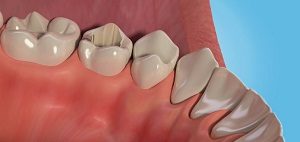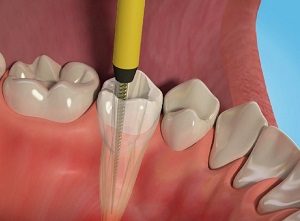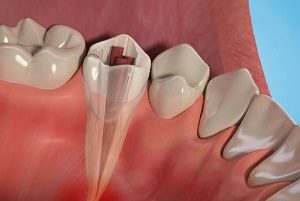Periodontics is the branch of dentistry concerned with the prevention, diagnosis and treatment of the supporting structures of the teeth. It is chiefly concerned with preventing the progress of gum disease, but can also involve the surgical correction of uneven or receding gums, and the placement of dental implants and their subsequent care.
Gum disease is a very common condition caused by the bacteria in plaque, which gradually builds up on the surface of the teeth and eventually hardens, becoming tartar. This can cause inflammation and bleeding of the gums, which is known as gingivitis and is the early reversible stage of the disease. If this is left untreated, it can develop into periodontitis, a more serious irreversible stage that can only be managed rather than cured, and which affects around 10-15% of the population. It can cause pockets to develop between the root of the tooth and the gum, which may result in tooth loss.
Symptoms
Although not always obvious, symptoms of gum disease can include:
- Bleeding when you brush
- Swollen, red gums
- Bad breath or a metallic taste
- Gum recession
- Sensitive teeth
Regular screening of teeth and gums can ensure any issues are swiftly spotted, helping to slow or halt the disease.
Treatment
The level of treatment required for gum disease will be based on the severity of the disease but it will include plaque control and demonstrating the most effective techniques for keeping teeth clean.
If gum disease has developed beyond the early stages, a thorough clean under the gums, known as root planing, will be required to remove hidden bacterial build up. This involves scaling of the root surface, which can reduce inflammation of the gum tissue. Surgical procedures can also be used to address deep gum pockets.
Risk factors
The chief risk factors for gum disease are poor oral hygiene, smoking, diabetes, having a genetic propensity, a lowered immunity and certain medications. Early diagnosis and prevention are the best ways to help reduce your chances of developing the disease.
Taking care of teeth and gums can also benefit your whole body as inadequate oral hygiene has been linked to the development of certain health conditions, such as heart disease and strokes.
What is root canal treatment?
Root canal treatment (also called endodontics) is needed when the blood or nerve supply of the tooth (known as the pulp) is infected through decay or injury.
Why is root canal treatment needed?
 If root canal treatment (RCT) is not carried out, the infection will spread and the tooth may need to be taken out.
If root canal treatment (RCT) is not carried out, the infection will spread and the tooth may need to be taken out.
Does it hurt?
No. A local anaesthetic is used and it should feel no different to having an ordinary filling done.
What does it involve?
The aim of the treatment is to remove all infection .
.
Root canal treatment is a skilled and time-consuming procedure. Most courses of treatment will involve two or more visits to your dentist.
At the first appointment, the infected pulp is removed. Any abscesses, which may be present, can also be drained at this time. The root canal is then cleaned and shaped ready for the fil ling. A temporary filling is put in and the tooth is left to settle.
ling. A temporary filling is put in and the tooth is left to settle.
The tooth is checked at a later visit and when all the infection has cleared, the tooth is permanently filled
What will my tooth look like after treatment?
In the past, a root filled tooth would often darken after treatment. However, with modern techniques this does not usually happen. If there is any discolouration, there are several treatments available to restore the natural appearance.
Root canal treatment is usually very successful. However, if the infection comes back the treatment can be repeated.
Is it expensive?
You can have root canal treatment on the National Health Service. However, due to the time it takes and the skill needed, many dentists prefer to carry out this treatment privately. Your dentist will be pleased to give you an estimate.
What if I don’t have the treatment?
The alternative is to have the tooth out. Once the pulp is destroyed, it can’t heal and it is not recommended to leave an infected tooth in the mouth.
Although some people would prefer an extraction, it is usually best to keep as many natural teeth as possible.
Will the tooth be safe after treatment?
Yes. However, it is better to restore the tooth with a crown to provide extra support and strength to the tooth.
Where can this treatment be carried out?
Root canal treatment is a routine dental procedure, which your dentist will be happy to do for you.
What about aftercare?
Root-treated teeth should be treated just the same as any other tooth. Remember to clean your teeth at least once a day, preferably with a fluoride toothpaste. Cut down on sugary snacks, and keep them only to mealtimes if possible. See your dentist for regular check-ups.
